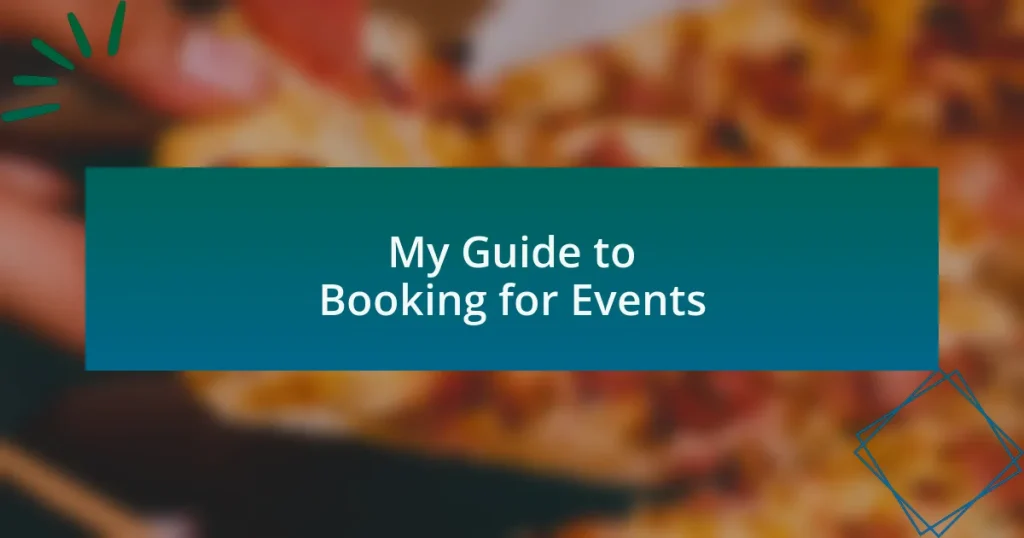Key takeaways:
- Event booking is about creating a memorable experience through open communication with the venue, managing details like guest size and atmosphere.
- Selecting the right venue enhances the event’s tone and includes practical considerations like accessibility and personal connections with staff.
- British bistros offer a cozy atmosphere, a mix of traditional and modern menu options, and foster community interactions, making dining experiences special.
- Personalizing events through custom menus, décor, and interactive elements can transform gatherings into unforgettable experiences.
Author: Evelyn Harrington
Bio: Evelyn Harrington is an acclaimed author known for her evocative storytelling and intricate character development. With a background in literature and creative writing, she has published several best-selling novels that explore themes of resilience and identity. Her work has garnered numerous awards, including the prestigious Waverly Prize for Fiction. When she’s not writing, Evelyn enjoys hiking the scenic trails of her hometown and engaging with her readers through her popular blog. She currently resides in Portland, Oregon, where she continues to craft compelling narratives that resonate with audiences worldwide.
Overview of Event Booking
Event booking is more than just securing a table; it’s about crafting a memorable experience. I remember the thrill I felt planning my friend’s surprise birthday party at a local bistro. The anticipation of how those intimate moments would unfold really brought the space to life in my mind.
When diving into the process, consider the different facets involved—size of the gathering, desired atmosphere, and specific requirements like menu choices. Have you thought about how those details will shape your event? Each aspect can influence the mood and flow, ensuring your gathering is seamless and enjoyable for everyone involved.
It’s vital to communicate openly with the venue about your vision. I once felt overwhelmed trying to express my ideas for a corporate event, but the staff’s willingness to listen transformed my stress into excitement. This dialogue can make all the difference, turning mere reservations into personalized experiences that resonate with you and your guests.
Importance of Venue Selection
Choosing the right venue is crucial, as it sets the tone for your entire event. I once attended a wedding that took place in a stunning garden, and the ambiance instantly created a magical atmosphere that made every detail feel special. Have you ever considered how the décor and layout can shape your guests’ experiences? The right venue elevates the occasion, allowing for cherished moments to unfold seamlessly.
Consider the practical aspects of venue selection, too. For instance, I learned the hard way that accessibility can determine guest turnout. At a recent gathering, the venue’s location proved difficult for some friends to reach. It made me realize how essential it is to prioritize convenience alongside aesthetics when making your choice.
I also believe that personal connections with the venue staff can significantly enhance the planning process. The last time I booked a space for a family reunion, the team went above and beyond to accommodate our diverse needs, from dietary restrictions to a specific layout for activities. This attentive service reinforced my belief that a great venue isn’t just about the space itself; it’s about the relationships that help bring your vision to life.
Understanding British Bistro Features
British bistros offer a unique charm that sets them apart from other dining establishments. From my experience, these venues often combine warmth and informality, inviting guests to feel at home while enjoying quality cuisine. Can you think of any place where you felt instantly relaxed just by stepping inside? That cozy atmosphere is one of the standout features of a bistro.
The menu in a British bistro typically showcases a delightful mix of traditional dishes and modern twists. I recall visiting one that offered a classic beef Wellington alongside an innovative vegetarian shepherd’s pie. It was fascinating to see how they balanced the old with the new, ensuring there’s something for everyone. Have you ever tasted a dish that perfectly encapsulated its culture? It’s that kind of thoughtfulness in menu selection that makes a bistro experience memorable.
Another notable feature is the emphasis on community and social interaction. I remember enjoying a lively dinner where the owner encouraged guests to mingle, sharing stories and laughter across the tables. This focus on community is intrinsic to the bistro culture, creating connections among guests that go beyond the food. Who wouldn’t want to be a part of such a vibrant atmosphere? It’s moments like these that can make events in a bistro so much more than just a meal; they become shared experiences that linger in the heart long after you’ve left.
Key Considerations for Reservations
When considering reservations at a British bistro, it’s crucial to think about the timing. Popular times, especially on weekends, can fill up quickly. I remember the disappointment of arriving without a reservation only to find the place buzzing with guests. Have you experienced that sinking feeling when you realize you’ve missed out? Booking in advance not only secures your spot but also ensures that you can enjoy your meal at a time that works best for you.
Another key factor is assessing the size of your party. If you’re planning a special celebration, dining with a larger group can sometimes limit your options. I once organized a birthday dinner for a friend and had to frantically search for a bistro that could accommodate our lively group. It taught me the importance of checking seating arrangements and capacity beforehand. How many guests are you hoping to invite? Knowing this upfront can greatly improve your overall experience and help avoid any last-minute hiccups.
Lastly, consider any dietary restrictions or special requests. I’ve had moments where I was amazed by how accommodating a bistro can be when I communicated my needs in advance. Whether it’s vegan options or gluten-free dishes, don’t hesitate to ask. It feels wonderful to dine somewhere that genuinely cares about your experience. What memories would you want to create at your next meal? Ensuring that your reservation aligns with your preferences can enhance your meal and create a delightful atmosphere.
Tips for Navigating Menus
When you first look at a menu, it can feel overwhelming, especially at a British bistro with so many tempting options. I often find it helpful to focus on the categories—such as starters, mains, and desserts—rather than trying to absorb everything at once. Have you ever noticed how narrowing your focus can make decisions clearer?
Another tip is to attend to the descriptions of dishes. I remember a time when I hesitated between a classic beef Wellington and a fish pie. The detailed description of the fish pie—fresh fish in a creamy sauce topped with buttery mash—pulled me in and made my choice easier. How often do you find that a well-crafted description sparks excitement about a dish?
Lastly, don’t shy away from asking your server for recommendations. One of my favorite dining experiences happened when I inquired about the chef’s special that evening. The server passionately highlighted a seasonal dish, and I ended up ordering it. That connection can enhance your meal—have you ever thought about the joy that comes from shared insights? Engaging with the staff adds a personal layer to your dining experience that menus alone often can’t provide.
Personalizing Your Event Experience
Personalizing your event experience is all about creating moments that resonate with your guests. I recall hosting a birthday party at a British bistro, where I opted to customize the menu based on the dietary preferences of my friends. Wouldn’t it be amazing if every dish served felt like a nod to someone’s taste? That kind of thoughtfulness can turn an ordinary event into something truly memorable.
Another way to make your event stand out is by incorporating personal touches in the décor. For instance, I remember attending a wedding at a British bistro where the couple displayed photos from their favorite moments together. It added a warm, intimate feel to the space that connected everyone instantly. Have you ever walked into an event and felt that immediate sense of belonging? That’s the kind of atmosphere that personal elements can create.
Finally, consider engaging with a few interactive elements tailored to your guests. During a recent gathering I organized, we had a DIY cocktail station featuring unique twists on traditional British cocktails. It encouraged mingling and sparked delightful conversations. Isn’t it fascinating how a simple addition can transform how people connect? Personalizing events in such ways can elevate the overall experience, making it something your guests will talk about long after it’s over.
Feedback and Follow-Up Practices
Gathering feedback after an event is crucial for continuous improvement. I remember hosting a networking evening at a British bistro where I sent out a simple survey to attendees the next day. The responses not only highlighted what guests enjoyed but also provided insights into areas for enhancement. Have you ever thought about how a quick follow-up could reveal gems of information that transform your future events?
Engaging the attendees post-event fosters a sense of connection and shows them their opinions matter. After one dinner party, I reached out to my guests via email to express my gratitude and to gather their thoughts on the menu and ambiance. The warm feedback reassured me that I was heading in the right direction, while constructive criticism helped me refine the experience for the next gathering. Isn’t it powerful to learn that a little outreach can reinforce relationships and improve events?
Lastly, follow-up practices can also open doors for future collaborations or referrals. For example, I once connected with a few attendees after an event, inviting them to return for a special tasting menu. This not only built a loyal clientele but also created lasting memories. Have you considered how these simple yet effective practices can extend beyond feedback, deepening the bond with your guests? It’s a win-win situation that continuously strengthens your event planning skills.


